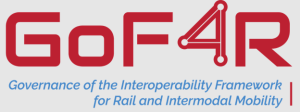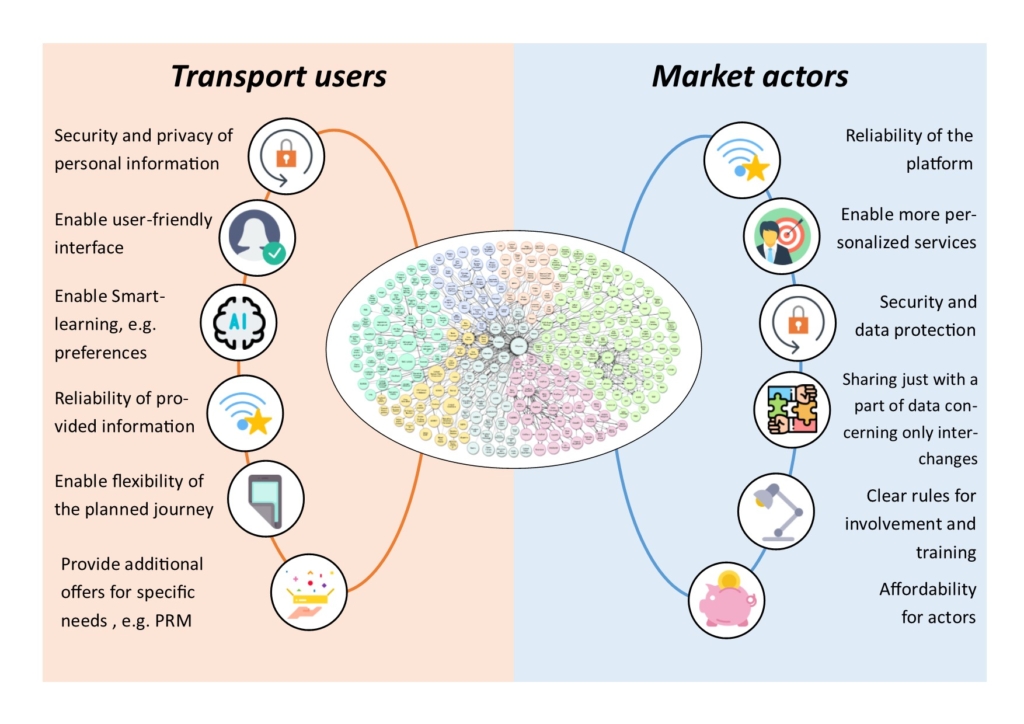 Within the GOF4R project, EPF is the leader of Work Package 2 on ‘User Demand’. The report Analysis of the demand of travellers for the TC summarises the results obtained. The full report is now available for download.
Within the GOF4R project, EPF is the leader of Work Package 2 on ‘User Demand’. The report Analysis of the demand of travellers for the TC summarises the results obtained. The full report is now available for download.
The objective of the Governance of the Interoperability Framework for Rail and Intermodal Mobility project (GOF4R) is to define sustainable governance for the Interoperability Framework semantic technologies that are being developed under the IP4 Shift2Rail programme.
Within IP4, the objective is to create a seamless multimodal travel experience by providing travellers with smart personalised services to facilitate each stage of the journey. Travellers can access all these services through their ‘Travel Companion’ (TC), which functions as a ‘front end’ user interface, giving users full control of their door-to-door travel experience. Travellers can use the Travel Companion (which considers personal preferences, including mobility constraints) to plan their trip, manage bookings, validate entitlements, navigate at interchanges and, in case of disruptions, find alternative solutions for re-routing and re-accommodation. In the ‘back end’, the ‘Interoperability Framework’ (IF) guarantees technical interoperability of multimodal services by insulating consumer applications from the task of locating, harmonising and understanding an open-ended world of data, events and service resources, which are consequently made available ‘as a service’.
In order to design and develop a sustainable and successful IF governance, the requirements from the different actors in the transport chain need to be mapped and analysed. This Deliverable D2.1 presents the outcomes of Task 2.1 within GOF4R, which focuses on the “Analysis of the consumer demands and interest in using the TC capabilities”. The needs and requirements of other market actors (operators, authorities, service providers) are addressed in a separate Deliverable D2.2 “Analysis of the demand of market actors for the IF”.
Travellers do not interact directly with the Interoperability Framework. That is why in this Deliverable the focus will not be on the Interoperability Framework as such but rather on the different functionalities developed based on or thanks to the IF, which the traveller can access through his/her Travel Companion. This report identifies and describes conditions for a large market uptake of the Travel Companion approach by the end-users: the travellers.
As a first step, the Travel Companion has been ‘deconstructed’ into its consumer-oriented capabilities and interaction points. For each interaction point, a series of assumptions have been formulated with regard to factors (incentives, needs, constraints, barriers) that could influence the consumer uptake of the TC approach. These assumptions were validated by means of interviews with stakeholders. Workshops have been organised in Belgium, Italy, Slovakia and the Czech Republic, in order to better understand the conditions for market uptake of the Travel Companion approach and to assess potential ethnographic differences between countries and cultures. Finally, the findings obtained during the interviews as well as the national workshops were presented and further discussed at a European-wide workshop with S2R IP4 and other experts.
Deliverable D2.1 provides input for the task “Analysis of impacts on the governance solution” – and for its relevant Deliverable D2.3 (same title). Linking the research done in Task 2.1 and 2.2, D2.3 will formulate recommendations that can be used in other GOF4R Work Packages as well as in other Shift2Rail IP4 projects.
Click here to download D2.1 ‘Analysis of the demand of travellers for the TC’.
Click here to download D2.3 ‘Analysis of impacts on the governance solution’.



 Stay informed!
Stay informed!